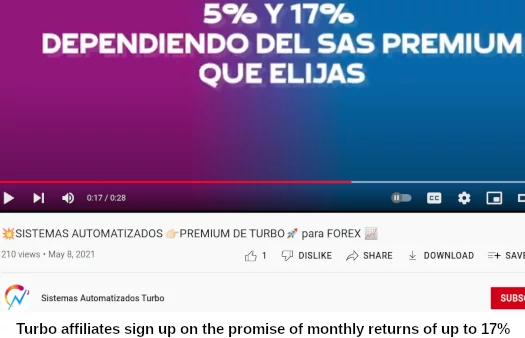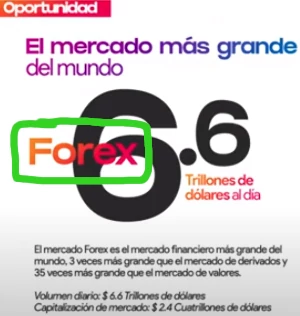
[ad_1]
 Turbo, additionally marketed as “We Are Turbo”, fails to supply firm possession info on its web site.
Turbo, additionally marketed as “We Are Turbo”, fails to supply firm possession info on its web site.
Turbo’s web site area (“weareturbo.io”), was first registered in 2020. The personal registration was final up to date on December eighth, 2021.
Turbo’s web site defaults to Spanish. The corporate’s advertising materials can also be all in Spanish.
Additional analysis reveals Turbo advertising materials citing David Merino as founder and CEO of the corporate.

Why this info isn’t offered on Turbo’s web site is unclear.
Previous to Turbo David Merino headed up Frequency as CEO:

Frequency was a buying and selling bot MLM scheme. It seems to have collapsed on or round January 2021. This coincides with Turbo’s preliminary area registration on December eighth, 2020.
Learn on for a full evaluate of Turbo’s MLM alternative.
Turbo’s Merchandise
Turbo has no retailable services or products.
Associates are solely capable of market Turbo affiliate membership itself.
Turbo’s Compensation Plan
Turbo associates make investments on the promise of a 5% to 17% month-to-month return.

Turbo claims to generate returns by means of buying and selling bots, which it sells subscriptions to:
- SA1 – 5% to 7% month-to-month ROI, prices $119 after which $99 a month
- SA2 – 7% to 10% month-to-month ROI, prices $399 after which $149 a month
- SA3 – 10% to 17% month-to-month ROI, prices $999 after which $199 a month
- Premium SA1 – 5% to 7% month-to-month ROI, prices $1000 each 6 months
- Premium SA2 – 7% to 10% month-to-month ROI, prices $2500 each 6 months
- Premium SA3 – 10% to 17% month-to-month ROI, prices $3500 each 6 months
The non-Premium plans are considerably cheaper. The marketed returns are the identical so I’m undecided what the distinction between the 2 kinds of subscriptions is.
Observe that no matter which subscription is chosen, Turbo expenses a 15% price on generated returns.
The MLM facet of Turbo pays on subscription charges paid by recruited associates.
Referral Commissions
Turbo pays a 20% fee on subscription charges paid by personally recruited associates.
- earn $150 on the sale of a Premium SA1 subscription
- earn $375 on the sale of a Premium SA2 subscription
- earn $525 on the sale of a Premium SA3 subscription
Residual Commissions
Turbo pays residual commissions through a unilevel compensation construction.
A unilevel compensation construction locations an affiliate on the high of a unilevel group, with each personally recruited affiliate positioned straight underneath them (stage 1):

If any stage 1 associates recruit new associates, they’re positioned on stage 2 of the unique affiliate’s unilevel group.
If any stage 2 associates recruit new associates, they’re positioned on stage 3 and so forth and so forth down a theoretical infinite variety of ranges.
Turbo pays a 5% residual fee on returns paid throughout ten unilevel group ranges.
Observe that recruitment is required to qualify for residual commissions:
- recruit 1 affiliate and earn residual commissions on two unilevel group ranges
- recruit 2 associates and earn residual commissions on 4 unilevel group ranges
- recruit 3 associates and earn residual fee on six unilevel group ranges
- recruit 4 associates and earn residual commissions on eight unilevel group ranges
- recruit 5 associates and earn residual commissions on ten unilevel group ranges
Recruited associates should have an lively subscription to rely in direction of residual fee qualification standards.
HolderX Commissions
HolderX commissions look like a bonus paid on
the operations of the subscribers of your group as much as the third stage!
What this implies is unclear. It sounds prefer it’s a straight up addition to residual commissions, however with out the recruitment necessities.
In any occasion, commissions paid out on as much as three unilevel group ranges through HolderX are as follows:
- stage 1 – 5%
- stage 2 – 3%
- stage 3 – 2%
ShareX Bonus Swimming pools
Turbo takes 15% of month-to-month subscription price income and locations it into two rank-based bonus swimming pools.
- 25K Entrepreneurs who’ve recruited one affiliate that month obtain a share in a 5% ShareX bonus pool
- 50K Entrepreneurs who’ve recruited two associates that month obtain a share in a ten% ShareX bonus pool
Observe that Turbo don’t present rank qualification standards.
Becoming a member of Turbo
Becoming a member of Turbo requires fee of both month-to-month or bi-annual subscription charges.
- SA1 – $119 after which $99 a month
- SA2 – $399 after which $149 a month
- SA3 – $999 after which $199 a month
- Premium SA1 – $1000 each 6 months
- Premium SA2 – $2500 each 6 months
- Premium SA3 – $3500 each 6 months
Observe all funds inside Turbo are made in bitcoin.
Turbo Conclusion
Turbo’s MLM alternative presents just a few instant crimson flags.
The primary isn’t any details about the corporate’s buying and selling bots is disclosed.
Turbo is basically a continuation of Frequency underneath a distinct identify. Identical persons are working the present and it’s the identical buying and selling bot alternative.
This begs the query why did Frequency collapse?
Additionally having operated for just a few years underneath two firm names, the place are the audited buying and selling outcomes?
I believe Frequency was deserted after recruitment collapsed.
This might counsel Turbo’s buying and selling bot is secondary to recruiting and incomes off subscription charges. This might functionally make Turbo a pyramid scheme.
The second instant concern is Turbo clearly providing a passive funding alternative.
It seems to be the “lulz can’t contact our cash!” mannequin. That’s associates pay for entry to a bot, which is then linked to their buying and selling account.
MLM firms providing passive returns must register with monetary regulators. Turbo offers no proof it has registered with monetary regulators.
David Merino seems to be based mostly out of Spain. Securities in Spain are regulated by the Comisión Nacional del Mercado de Valores (CNMV).
Not registering with the CNMV or some other monetary regulator signifies that, at a minimal, Turbo is committing securities fraud and working illegally.
The third crimson flag is Turbo solely accepting subscription charges in bitcoin.
Turbo represents its bots interact in foreign currency trading:

Bitcoin being the solely fee possibility comes off as an try to dodge regulation. When Turbo collapses like Frequency, it should additionally make it near unimaginable for sufferer restoration.
 The fourth crimson flag is Turbo touting a ten% to 17% month-to-month ROI. If that was constantly potential, David Merino would have been working these bots since Frequency.
The fourth crimson flag is Turbo touting a ten% to 17% month-to-month ROI. If that was constantly potential, David Merino would have been working these bots since Frequency.
With even a minimal capital quantity, absolutely after 2+ years compounding month-to-month he’d be set?
“Lulz can’t contact our cash” scams sometimes collapse when the admin(s) rig trades of their favor. This leads to associates waking up at some point to drained accounts.
“Our bot malfunctioned!” or “we received hacked!” are widespread cowl excuses.
Both approach the top consequence is identical: the vast majority of individuals in buying and selling schemes like Turbo lose cash.
[ad_2]
Supply hyperlink